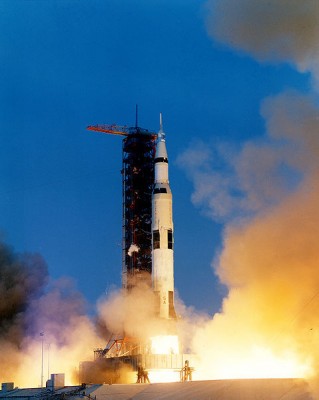
Apollo 13 launches from Kennedy Space Center, April 11, 1970 (Photo by NASA)
It’s back to school today for students at four high schools and five middle schools in Houston. These students won’t only have an extra five days tacked on to their school year compared to their peers who start next Monday — they’ll also have a school day that lasts from 7:45 am to 4:15 pm Monday through Thursday, and from 7:45 am to 3:15 pm on Fridays.
Sounds like the winning formula of many charter schools, but these are all traditional public schools. They’ve just been targeted to undergo extensive reforms through Apollo 20, a new program of the Houston Independent School District. The program’s name was initially inspired by Apollo 13’s famous “Houston, we have a problem,” although Superintendent Terry Grier prefers to frame it as “Houston, we have an opportunity.”
The nine schools that have been flagged as “in need of improvement” (or that are rapidly heading in that direction) will adopt strategies that have been identified by Harvard economist Roland Fryer as working in successful urban and charter schools. These include extending the school day, driving instruction through routine data collection and providing an hour of one-on-two tutoring in math each day for sixth- and ninth-graders.
This project is one of the largest education reforms that any district is currently undertaking, according to Grier. But it’s going largely unnoticed at the national level. Perhaps that’s because it hasn’t ignited the same debate as have other reforms, like the opening of more charter schools or the development of new teacher-evaluation systems. The teachers’ union, which doesn’t have as strong a presence in Houston as it does in many large cities, hasn’t raised major objections, and no one else seems openly opposed to the reforms.
Or perhaps it’s because there are no results – good or bad – to discuss yet. Even the most preliminary results won’t be available for months, and a true sense of the program’s success or failure is years away.
Apollo 20, funded by federal grants and private and foundation donations, would seem to have many of the necessary ingredients for success: a dedicated faculty and administration, a solid research base and all the right buzzwords (e.g., “data,” “commitment,” “human capital”). And Houston is hopeful it’ll not only work but that it’ll be able to proceed as planned and expand to 11 elementary schools next year.
It’s an experiment worth watching. Many educators and policymakers have speculated over just how sustainable charter school practices are, and whether they can be transferred to traditional public schools. This is a chance to get some real answers.
Geoffrey Canada, founder of the Harlem Children’s Zone, knows all about the importance of experiments and whether they can be taken to scale. President Barack Obama wants to replicate the Harlem Children’s Zone in poor urban areas across the nation, and he’s allocated $210 million to the “Promise Neighborhoods Initiative” to do so.
Canada, for his part, has traveled around the country in hopes of inspiring educators to follow his lead. So far, “not one city has stepped up,” he said at a recent talk in Houston with Fryer. “America has decided that the only answer is to do a charter school and save two percent of the kids.”
While Canada believes the practices at Harlem Children’s Zone are replicable, a resistance to work outside the margins has prevented any large-scale reforms.
“You can do anything you want in education as long as you don’t change anything,” Canada said. “Heavens forbid we would ask people to work a little longer and a little harder.”
But that’s precisely what Houston has done. Every teacher employed at these nine schools had a “commitment talk” in which they were told of the new expectations. The district helped those unwilling or uninterested in taking on the new load to find jobs elsewhere by hosting a large job fair. Many elected to stay. Nine new principals were also hired, in a very selective process, as were over 200 math tutors.
And, in a less tangible move, the schools plan on creating a culture that charter schools currently have a monopoly on: They’ll be the “first ‘no-excuses’ public schools the country has ever seen,” Fryer said. Under this mentality, the schools will aim not only to have 100 percent of students performing at grade level, but also 100 percent graduating and attending college as well. The graduation rates of the four high schools in the Apollo 20 program are currently between 62 and 70 percent.
Still, as Fryer pointed, even if Apollo 20 had only 80 percent of the success that Canada’s organization has seen, the sheer scale of the project would mark it as a very successful reform for a public school district. That, though, is a tall order in itself.
“I don’t want to pretend it’s going to be easy,” Canada said. “But it is absolutely doable.”



